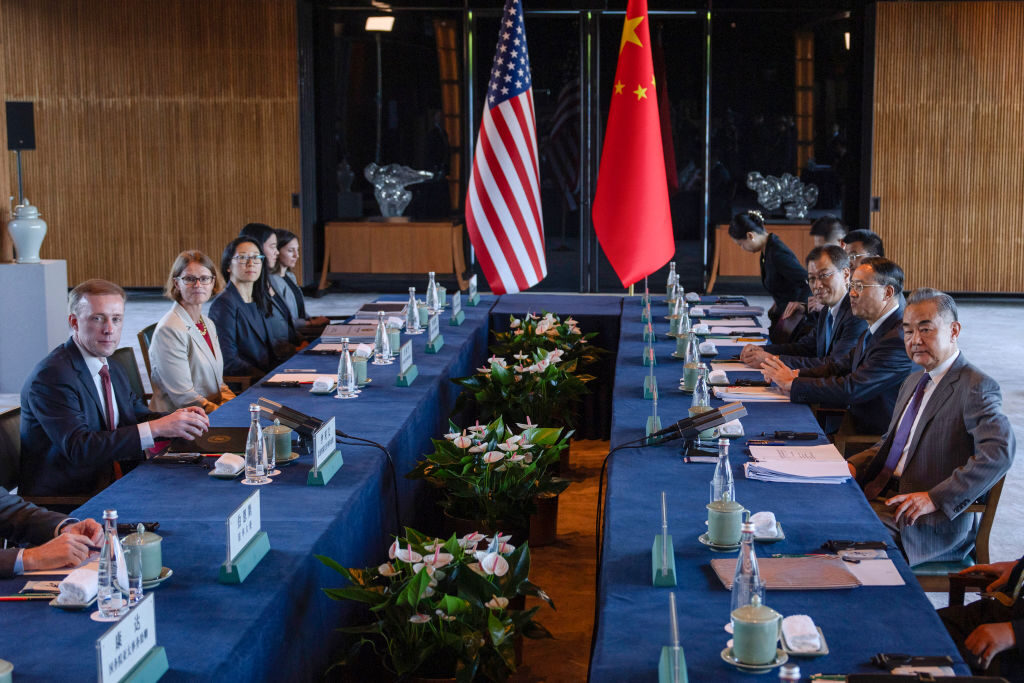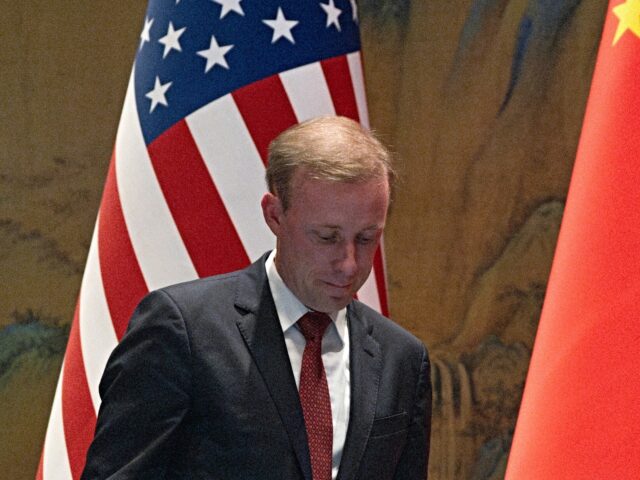National Security Adviser Jake Sullivan completed a first day of talks with Chinese Foreign Minister Wang Yi in Beijing on Tuesday in which he focused on “candid, substantive, and constructive discussions” on keeping the tenor of the bilateral relationship friendly, the White House detailed on Wednesday.
Sullivan arrived for his first visit to China as national security adviser on Tuesday and is expected to stay through Thursday. Previewing his travel, potentially one of the last in-person exchanges between the administration of outgoing President Joe Biden and the Chinese Communist Party, an unnamed senior White House official predicted that Sullivan and Wang would hold discussions lasting from ten to 12 hours, as they have in the past.
The Chinese broadcaster CGTN aired a video on Wednesday of Sullivan and Wang briefing reporters before their private conversation in which they emphasized seeking to avoid open hostilities, despite their disagreements on fundamental political issues such as genocide, the existence of private property, and colonialism.
Chinese state media previewed the meetings with belligerent articles demanding that Sullivan use the visit to learn “how to listen” and abandon an “incorrect position and understanding of China,” emphasizing China’s false claims to the sovereign nation of Taiwan.
The White House readout of Sullivan’s meeting with Wang noted that the two discussed China’s threats to colonize Taiwan, but prioritized topics in which it claimed the two found common ground.
“They discussed progress and next steps on implementation of the Woodside Summit commitments, including counternarcotics, military-to-military communications, and AI safety and risk,” the readout detailed. “Mr. Sullivan and Director Wang discussed next steps to reduce the flow of illicit synthetic drugs, continue repatriation of undocumented migrants, and law enforcement cooperation.”
“They underscored the importance of concrete steps to tackle the climate crisis and welcomed further discussions during Senior Advisor to the President for International Climate Policy John Podesta’s upcoming travel to China,” the statement continued.
The White House also hinted that, thanks to the meeting between the two, Biden and genocidal Chinese dictator Xi Jinping would hold a “a leader-level call in the coming weeks.”
The flagship Chinese news network Xinhua similarly listed “drug control, law enforcement, repatriation of illegal immigrants, and climate change mitigation” as topics of discussion in its report on the talks on Wednesday. It offered no details on the content of the conversations aside from a mutual commitment to cooperate on the listed topics.
China is one of the world’s most destructive forces on each one of the topics Xinhua listed. On drug control, China is the source of the vast majority of precursor ingredients to produce fentanyl, a deadly opioid killing thousands of Americans a year. The Chinese government has engaged in expansive illegal “law enforcement” activities globally, including the establishment of illegal “police stations” to persecute anti-communists on U.S. soil. The number of Chinese nationals entering America illegally has skyrocketed in the past decade, and China is the world’s worst polluter.
The Global Times, China’s most belligerent state-run newspaper, reported on Wednesday that Sullivan used his time with Wang to insist that Biden would not challenge China on any of its malignant activities.

China’s Foreign Minister Wang Yi (R) and US National Security Advisor Jake Sullivan (L) pose for photos before talks at Yanqi Lake in Beijing on August 27, 2024. (NG HAN GUAN/POOL/AFP via Getty Images)
“President Biden is committed to managing the US-China relationship responsibly, avoiding competition from turning into conflict, and cooperating in areas of common interest, Sullivan said,” according to the Times.
The state newspaper’s “Chinese experts” said that Wang would use the ongoing conversations to “help the US to be more reasonable and rational,” meaning more amenable to the Communist Party’s agenda, especially on Taiwan.
“China will focus on raising serious concerns regarding the Taiwan question, addressing development rights and strategic security in discussions with the US during Sullivan’s visit to Beijing,” the Times quoted the Chinese Foreign Ministry as saying.
American outlets suggested that, should Sullivan not anger his Chinese hosts during his visit, Xi and Biden may meet in person one last time before his presidential term ends. Voice of America suggested that some possible venues for such a meeting include “the Asia-Pacific Economic Cooperation forum in Peru from Nov. 10 to 16, or at the G20 summit in Brazil on Nov. 18 and 19.”
Sullivan will complete his trip to Beijing on Thursday. The national security adviser has become Biden’s point person for diplomacy with China as Secretary of State Antony Blinken has focused on the ongoing war in Gaza, meeting with Wang Yi four times in the last year and half, according to the White House. The talks are part of negotiations tied to Biden’s last in-person meeting with Xi in San Francisco in November, which lasted four hours and resulted in no substantive improvements to China’s nefarious behavior on the world stage. Xi did reportedly agree to resume military-to-military communication – which had stopped after former speaker of the House, Rep. Nancy Pelosi (D-CA), visited Taiwan in 2022 – and to, nominally, help combat the fentanyl scourge.
Prior to their private conversations, however, Xi used the press conference alongside Biden to emphasize that he would use his time to fight tariffs on Chinese goods and efforts to hurt China’s global monopoly on manufacturing.
“Industrial and supply chains are still under the threat of interruption and protectionism is rising. All these are grave problems,” Xi told reporters. “For two large countries like China and the United States, turning their back on each other is not an option. It is unrealistic for one side to remodel the other, and conflict and confrontation has unbearable consequences for both sides.”
The topic did not feature prominently in Chinese or American reports of the first day of Sullivan’s talks, though is expected to surface on Wednesday or Thursday.

COMMENTS
Please let us know if you're having issues with commenting.